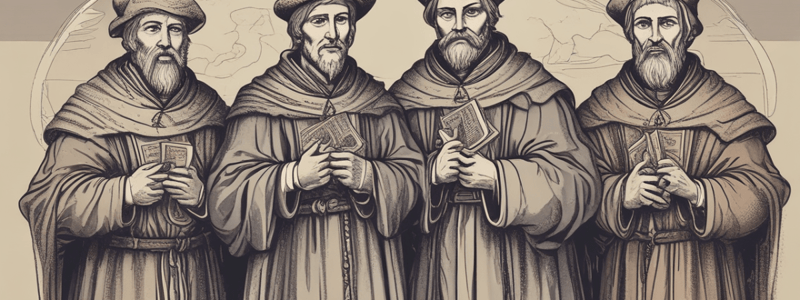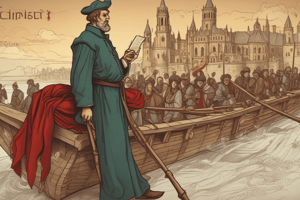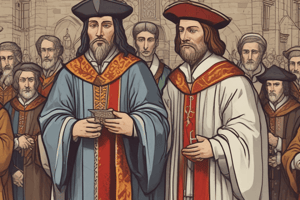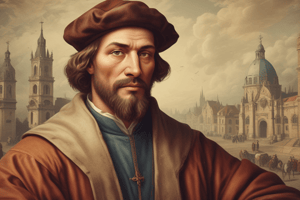Podcast
Questions and Answers
What was the primary concern of Martin Luther that led to the Protestant Reformation?
What was the primary concern of Martin Luther that led to the Protestant Reformation?
- The role of the family as the center of life
- The emphasis on education for girls
- The corrupt practice of the Roman Catholic Church
- The indulgences (correct)
What was a significant cultural change during the Protestant Reformation?
What was a significant cultural change during the Protestant Reformation?
- The increased power of the Catholic clergy
- The increasing role of the family as the center of life (correct)
- The rising popularity of the Jesuits
- The emphasis on predestination
What was the Catholic Church's response to the Protestant Reformation?
What was the Catholic Church's response to the Protestant Reformation?
- The Protestant Revolution
- The Catholic Counter-Reformation
- The Catholic Reformation (correct)
- The Council of Trent
Who was a notable reformer who believed in predestination?
Who was a notable reformer who believed in predestination?
What was the significance of the Ninety-Five Theses?
What was the significance of the Ninety-Five Theses?
What was a consequence of the Protestant Reformation for women?
What was a consequence of the Protestant Reformation for women?
What was the primary goal of the Protestant Reformation?
What was the primary goal of the Protestant Reformation?
What was the name of the group created during the Catholic Reformation?
What was the name of the group created during the Catholic Reformation?
What was a result of the Protestant Reformation for education?
What was a result of the Protestant Reformation for education?
What was a limitation of the Protestant Reformation for peasants?
What was a limitation of the Protestant Reformation for peasants?
What were the two main watchwords of the Protestant Reformation?
What were the two main watchwords of the Protestant Reformation?
What was the result of the Catholic Church's response to the Protestant Reformation?
What was the result of the Catholic Church's response to the Protestant Reformation?
Who is credited with rediscovering the Americas in 1492?
Who is credited with rediscovering the Americas in 1492?
What was the Columbian Exchange?
What was the Columbian Exchange?
What was the main reason for the expansion of the Catholic faith during the Age of Exploration?
What was the main reason for the expansion of the Catholic faith during the Age of Exploration?
What was the result of the Age of Exploration on Native American societies?
What was the result of the Age of Exploration on Native American societies?
What was the name of the monastic order dedicated to the Pope and engaged in extensive missionary activity?
What was the name of the monastic order dedicated to the Pope and engaged in extensive missionary activity?
What was the Treaty of Westphalia?
What was the Treaty of Westphalia?
What did the Age of Exploration lead to in terms of maritime trade and commerce?
What did the Age of Exploration lead to in terms of maritime trade and commerce?
What was the name of the era in history when European explorers began traveling to other continents?
What was the name of the era in history when European explorers began traveling to other continents?
What was one of the items brought back to the Old World from the New World?
What was one of the items brought back to the Old World from the New World?
What was the primary goal of mercantilism?
What was the primary goal of mercantilism?
What was the transatlantic slave trade characterized by?
What was the transatlantic slave trade characterized by?
Which European countries initially dominated the exploration of the New World?
Which European countries initially dominated the exploration of the New World?
What was the significance of Copernicus' book?
What was the significance of Copernicus' book?
What was the outcome of the Scientific Revolution?
What was the outcome of the Scientific Revolution?
What was the time period of the Scientific Revolution?
What was the time period of the Scientific Revolution?
Who developed the scientific method?
Who developed the scientific method?
What was the result of the Scientific Revolution on the Catholic Church and the monarchies?
What was the result of the Scientific Revolution on the Catholic Church and the monarchies?
What sciences made great progress during the Scientific Revolution?
What sciences made great progress during the Scientific Revolution?
Who published the heliocentric model in 'On the Revolutions of the Heavenly Spheres'?
Who published the heliocentric model in 'On the Revolutions of the Heavenly Spheres'?
What was Galileo Galilei's contribution to the development of astronomy?
What was Galileo Galilei's contribution to the development of astronomy?
What were the major advances in physics led by?
What were the major advances in physics led by?
What mathematical sciences were developed during the 16th and 17th centuries?
What mathematical sciences were developed during the 16th and 17th centuries?
Who developed human anatomy as a science?
Who developed human anatomy as a science?
What led to medicine and chemistry becoming disciplines during the 16th and 17th centuries?
What led to medicine and chemistry becoming disciplines during the 16th and 17th centuries?
What was the significance of the period's pioneering dissections, experimentation, and notation?
What was the significance of the period's pioneering dissections, experimentation, and notation?
During the 16th and 17th centuries, what was the primary focus of scientists in their study of the natural world and the human body?
During the 16th and 17th centuries, what was the primary focus of scientists in their study of the natural world and the human body?
What would not have developed without the period's pioneering work?
What would not have developed without the period's pioneering work?
What was the impact of the period's pioneering work on medicine and chemistry?
What was the impact of the period's pioneering work on medicine and chemistry?
What was the main catalyst for the Protestant Revolution?
What was the main catalyst for the Protestant Revolution?
What was a characteristic of the Protestant Reformation?
What was a characteristic of the Protestant Reformation?
What was the role of the family during the Protestant Reformation?
What was the role of the family during the Protestant Reformation?
What was the main motivation behind the Age of Exploration?
What was the main motivation behind the Age of Exploration?
What was the result of the Protestant Reformation on the Catholic Church?
What was the result of the Protestant Reformation on the Catholic Church?
What was a limitation of the Protestant Reformation?
What was a limitation of the Protestant Reformation?
What was the name of the process that exchanged goods and peoples between the Old and New Worlds?
What was the name of the process that exchanged goods and peoples between the Old and New Worlds?
What was the Catholic Church's response to the Protestant Reformation?
What was the Catholic Church's response to the Protestant Reformation?
Who began a monastic order dedicated to the Pope and engaged in extensive missionary activity?
Who began a monastic order dedicated to the Pope and engaged in extensive missionary activity?
What was a positive result of the Protestant Reformation?
What was a positive result of the Protestant Reformation?
Who was a notable reformer who carried on the causes of the Protestant Reformation?
Who was a notable reformer who carried on the causes of the Protestant Reformation?
What was the consequence of the Age of Exploration on Native American societies?
What was the consequence of the Age of Exploration on Native American societies?
What were the two main watchwords of the Protestant Reformation?
What were the two main watchwords of the Protestant Reformation?
What was the focus of the Protestant Reformation?
What was the focus of the Protestant Reformation?
What was the significance of the Protestant Reformation?
What was the significance of the Protestant Reformation?
What was the result of the Counter-Reformation?
What was the result of the Counter-Reformation?
Who formulated the heliocentric model?
Who formulated the heliocentric model?
What was the outcome of the Protestant Reformation for the Catholic clergy?
What was the outcome of the Protestant Reformation for the Catholic clergy?
What was the name of the era in history when European explorers began traveling to other continents?
What was the name of the era in history when European explorers began traveling to other continents?
What was one of the positive consequences of the Age of Exploration?
What was one of the positive consequences of the Age of Exploration?
What was Galileo Galilei's contribution to astronomy?
What was Galileo Galilei's contribution to astronomy?
What was the outcome of the 30 Years War?
What was the outcome of the 30 Years War?
Who led the major advances in physics?
Who led the major advances in physics?
What mathematical sciences were developed during the 16th and 17th centuries?
What mathematical sciences were developed during the 16th and 17th centuries?
Who developed human anatomy as a science?
Who developed human anatomy as a science?
What led to medicine and chemistry becoming disciplines during the 16th and 17th centuries?
What led to medicine and chemistry becoming disciplines during the 16th and 17th centuries?
What was the primary focus of scientists during the 16th and 17th centuries?
What was the primary focus of scientists during the 16th and 17th centuries?
What would not have developed without the period's pioneering work?
What would not have developed without the period's pioneering work?
What was the significance of the period's pioneering dissections, experimentation, and notation?
What was the significance of the period's pioneering dissections, experimentation, and notation?
What was the outcome of the Scientific Revolution?
What was the outcome of the Scientific Revolution?
What was the Columbian Exchange characterized by?
What was the Columbian Exchange characterized by?
What was mercantilism's primary goal?
What was mercantilism's primary goal?
What was the result of the Scientific Revolution on society?
What was the result of the Scientific Revolution on society?
What was the significance of Copernicus' book?
What was the significance of Copernicus' book?
What was the outcome of the Scientific Revolution on the Catholic Church and the monarchies?
What was the outcome of the Scientific Revolution on the Catholic Church and the monarchies?
What sciences made great progress during the Scientific Revolution?
What sciences made great progress during the Scientific Revolution?
Who developed the scientific method?
Who developed the scientific method?
What was the significance of the Age of Exploration?
What was the significance of the Age of Exploration?
What was the transatlantic slave trade?
What was the transatlantic slave trade?
What was the primary goal of European explorers during the Age of Exploration?
What was the primary goal of European explorers during the Age of Exploration?
Flashcards are hidden until you start studying
Study Notes
The Protestant Reformation
- Began in 1517 when Martin Luther published his Ninety-Five Theses
- Resulted in large portions of the European population leaving the Catholic Church
- Led to a loss of power for the Pope and Catholic clergy
- Positive consequences included:
- Increased emphasis on education for boys and girls
- Focus on independent thought
- Women gained new rights, such as the right to divorce and marry
- Increased role of the family as the center of life
- Despite the changes, most peasants found it impossible to change their everyday lives, even after leading significant revolts
- Other reformers, such as John Calvin, carried on the causes of the Protestant Reformation
- Calvin believed in predestination
The Catholic Reformation
- Was the Roman Catholic church's counter-movement to address the concerns of Martin Luther and other religious reformers
- The Council of Trent was convened to respond to the Protestant Reformation
- The Jesuits were a religious group created during the Catholic Reformation
- They engaged in extensive missionary activity for Catholicism
The Age of Exploration
- Was a time when European explorers began traveling en masse to other continents, especially the Americas
- Also known as the Age of Discovery
- Lasted from the 15th to the 18th century
- Explorers such as Christopher Columbus, John Cabot, Vasco Nunez de Balboa, and Ponce de Leon claimed new lands for their respective crowns
- The Columbian Exchange was the exchange of plants, fruits, vegetables, disease, and other items between the Old and New Worlds
- Positive consequences included the discovery of new foods from the Americas
- Negative consequences included the destruction of most Native American societies
The Columbian Exchange
- Was the exchange of plants, fruits, vegetables, disease, and other items between the Old and New Worlds after the explorations of Christopher Columbus
- Items taken back to the Old World included turkeys, tomatoes, and habanero peppers
- Items received by the New World included sugarcane, coffee, and horses
- Negative consequences included slavery and disease
Science and the Scientific Revolution
- Was a wave of scholars proposing a new way of thinking that transformed society through the elevation of science as the source of truth
- Key to this was the scientific method, developed by Francis Bacon
- The Scientific Revolution began when Copernicus published a book that challenged the view of the Earth as the center of the universe
- The climax of the Scientific Revolution was when Isaac Newton published his series of books, which used the scientific method to challenge many of the oldest traditional assumptions about the universe
- The Scientific Revolution established science, supported through experiments, as the source of truth, completely changing how society looked at and understood the universe
Medicine and Chemistry in the 16th and 17th Centuries
- Saw medicine and chemistry come into their own as disciplines
- Occurred largely due to the increased emphasis on empiricism by the scientists of the period
- Pioneering dissections, endless experimentation, and dedication to notation and observation led to the development of medicine and chemistry as highly specialized disciplines
The Protestant Reformation
- Began in 1517 when Martin Luther published his Ninety-Five Theses
- Resulted in large portions of the European population leaving the Catholic Church
- Led to a loss of power for the Pope and Catholic clergy
- Positive consequences included:
- Increased emphasis on education for boys and girls
- Focus on independent thought
- Women gained new rights, such as the right to divorce and marry
- Increased role of the family as the center of life
- Despite the changes, most peasants found it impossible to change their everyday lives, even after leading significant revolts
- Other reformers, such as John Calvin, carried on the causes of the Protestant Reformation
- Calvin believed in predestination
The Catholic Reformation
- Was the Roman Catholic church's counter-movement to address the concerns of Martin Luther and other religious reformers
- The Council of Trent was convened to respond to the Protestant Reformation
- The Jesuits were a religious group created during the Catholic Reformation
- They engaged in extensive missionary activity for Catholicism
The Age of Exploration
- Was a time when European explorers began traveling en masse to other continents, especially the Americas
- Also known as the Age of Discovery
- Lasted from the 15th to the 18th century
- Explorers such as Christopher Columbus, John Cabot, Vasco Nunez de Balboa, and Ponce de Leon claimed new lands for their respective crowns
- The Columbian Exchange was the exchange of plants, fruits, vegetables, disease, and other items between the Old and New Worlds
- Positive consequences included the discovery of new foods from the Americas
- Negative consequences included the destruction of most Native American societies
The Columbian Exchange
- Was the exchange of plants, fruits, vegetables, disease, and other items between the Old and New Worlds after the explorations of Christopher Columbus
- Items taken back to the Old World included turkeys, tomatoes, and habanero peppers
- Items received by the New World included sugarcane, coffee, and horses
- Negative consequences included slavery and disease
Science and the Scientific Revolution
- Was a wave of scholars proposing a new way of thinking that transformed society through the elevation of science as the source of truth
- Key to this was the scientific method, developed by Francis Bacon
- The Scientific Revolution began when Copernicus published a book that challenged the view of the Earth as the center of the universe
- The climax of the Scientific Revolution was when Isaac Newton published his series of books, which used the scientific method to challenge many of the oldest traditional assumptions about the universe
- The Scientific Revolution established science, supported through experiments, as the source of truth, completely changing how society looked at and understood the universe
Medicine and Chemistry in the 16th and 17th Centuries
- Saw medicine and chemistry come into their own as disciplines
- Occurred largely due to the increased emphasis on empiricism by the scientists of the period
- Pioneering dissections, endless experimentation, and dedication to notation and observation led to the development of medicine and chemistry as highly specialized disciplines
Studying That Suits You
Use AI to generate personalized quizzes and flashcards to suit your learning preferences.




